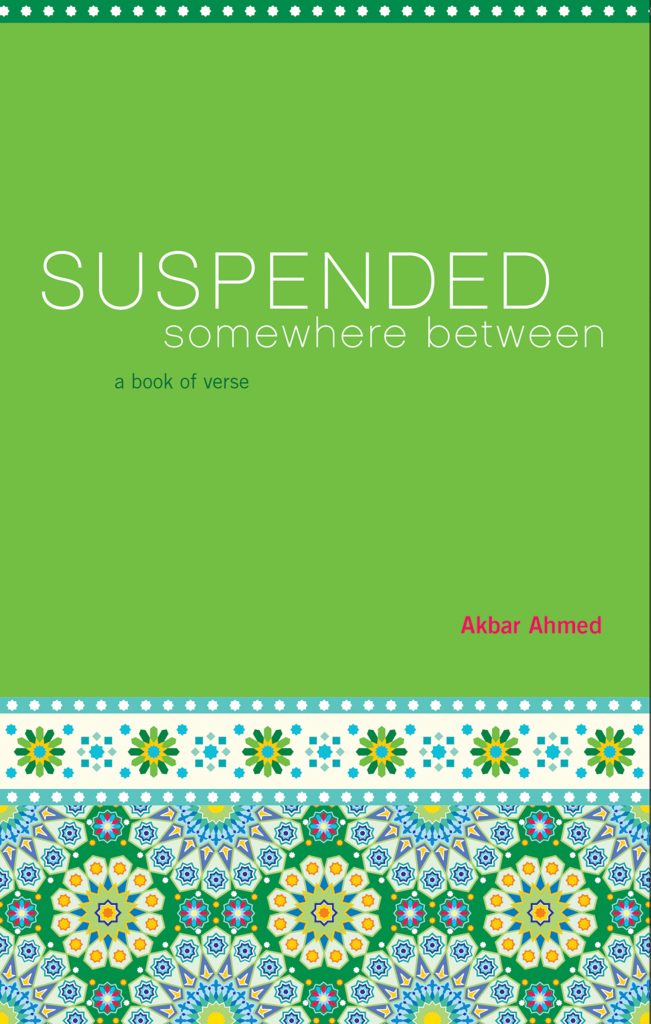By Shadab Zeest Hashmi
Pakistaniaat: A Journal of Pakistan Studies 3, no. 2 (2011)
In Akbar Ahmed’s Suspended Somewhere Between, the poems themselves seem to assume suspended shapes, moments hanging in the wide expanse of history that the author draws inspiration from. Not only are these poems suspended in time but between disparate cultures, between faith and intellect, between the personal and the public, ideational and palpable, between the sacred and secular, between love, hate and understanding. That Akbar Ahmed, who is considered by the BBC as “the world’s leading authority on contemporary Islam,” should choose to publish a book of poems, says a lot about his spiritual approach to the complex subject matter that has occupied him as a scholar for nearly half a century.
If read purely for poetic merit, this work
would fall short on many accounts as the author’s intent (as elaborated
in his preface) is not to write an ambitious work of poetry but rather
to chronicle the moments of his life that have shaped his deeper
understanding of historical dynamics. The power of this work is in its
large-spirited acceptance of everything—the noble, the questionable, the
profound, the grotesque and strange around him and within him. This
gesture of seeking higher wisdom in things scared or profane, and
acknowledging the powerful sweep of compassion has a Sufi flavor and is
supremely exemplified in the poem “Walking the Streets with the Dahta:”
The
cane-waving policeman/smiles at me/and takes care to reply in his
English/but the Dahta is unequivocal in his care/and perhaps the false
beggar/returns from him richer.
Ahmed’s declaration that he
has never edited his poems ought to serve as a guide as to what kind of
reader would glean the most from this work. These poems are not crafted
with the often ruthlessly precise artistic chisel of a seasoned poet,
rather, these are moments of inspiration caught raw, and recorded
promptly by an extremely precise thinker. His judicious spirit enables
Ahmed to present things as they are or as they were, without as much as a
scratch of the chisel. Even the more personal poems (some of which
border on being sentimental) from his young days are left untouched
because editing these would inflict a sort of censorship and concealment
of his younger self, which, to the reader’s benefit, Ahmed is bold
enough to embrace. The value for the reader here is to appreciate the
influences and the evolution of this great thinker of our times,
unhindered by cosmetic revisions.
The poems in this collection are centered on themes ranging from the spiritual to the political, personal to the historical and are written in various tonal registers. Because the book spans the author’s entire life and is unrevised, the style swings significantly from poem to poem. The work’s uneven literary quality becomes a lesser concern when one considers its incredible breadth and depth. Well-written lines such as: “Strings of spittle hang/at your mouth, you,/drooling, helpless/clutching wildly at air/your tiny body—just six months old—cannot move or obey your will/only your eyes lucidly convey and pierce me with love” (For Umar, With Love) more than make up for weaker ones such as “In robust days and ill health/In failure and in wealth/Through the highs and lows/ you always took for me the blows” (For Zeenat, Princess of my Heart).
The awkward redundancy in “On the western front frowned the eagle/ mighty Caesar in imperial regalia regal,” (I, Saracen) is compensated by the chilling lyrical narrative of The Meeting: “ a snake—the deadly village viper/it stood stock-still by the prayer-mat/ ” or by breathtaking poems such as Spring Thoughts in Farghana, which are striking in their immediacy despite the distance of history: “The pipe and the kettledrum/have sung the warrior to his sleep;/the mourners wail their way/back to the village/ High above, the mountains which stretch/like a young man’s ambition in springtime, an iced drizzle starts to speak…” Here is where we see the true gems of this collection.
Suspended Somewhere Between
does a remarkable job of exploring dualities and even multiplicities of
the self, of the loneliness and the longing for identity that has
anguished the Pakistani soul since its inception. Akbar Ahmed’s voice
is a vital contribution to the world of contemporary letters and he has
aptly been called “a national treasure.”
Akbar Ahmed is the Ibn
Khaldun Chair of Islamic Studies, American University in Washington,
D.C., the First Distinguished Chair of Middle East and Islamic Studies
at the U.S Naval Academy, Annapolis, and a non-resident senior fellow at
the Brookings Institution. A former ambassador of Pakistan to the UK,
Ahmed has taught at Harvard, Princeton and Cambridge Universities and is
the author of a dozen award-winning books. His most recent book is
called Journey into America—the Challenge of Islam (Brookings Press, 2010). Suspended Somewhere Between is Ahmed’s first book of poems.







